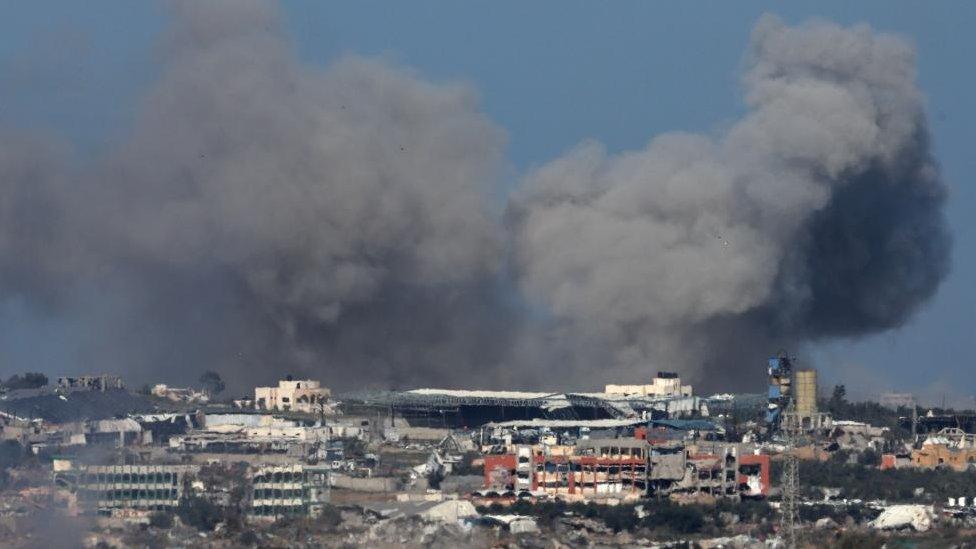Israel-Palestinian bitterness deepened by Hamas attack and war
- Published
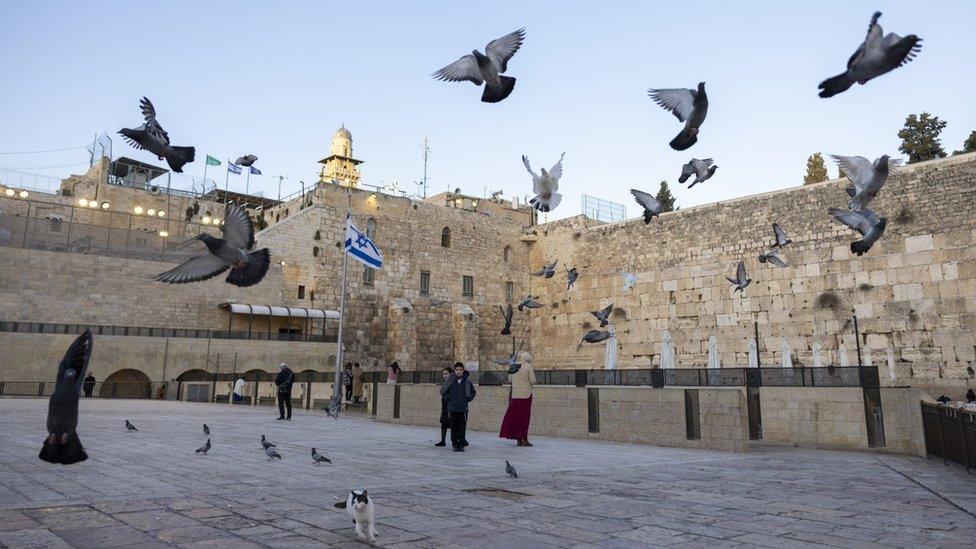
Support for the war remains high in Israel despite death toll in Gaza has surpassed 22,000 people
Even as war rages on in Gaza, causing huge loss of life, a recent survey suggests there is wide support among Palestinians for Hamas's deadly attacks on Israel which triggered it. Meanwhile, most Israelis are not focused on the killing of Palestinian civilians and back their country's military offensive to crush Hamas and bring home hostages, polls suggest.
Three months into the deadliest round of fighting in the decades-old conflict here, I have been asking Israelis and Palestinians in Jerusalem for their views.
Serving frothy coffees in the winter sunshine, the cafeterias in the west of the city are bustling. But for Israelis, the war raging in Gaza is a constant worry.
"It's always on our mind, we have many friends with children and relatives who are [soldiers] there in Gaza, and we pray for them a lot," says Edna, a religious Jewish woman from Bnei Brak.
"Just yesterday we visited the son of a friend who was very injured. They don't know if he will lose both his legs. By God's will, he won't," she says.
"And we keep on thinking about the hostages. It's like a piece of us is in there."
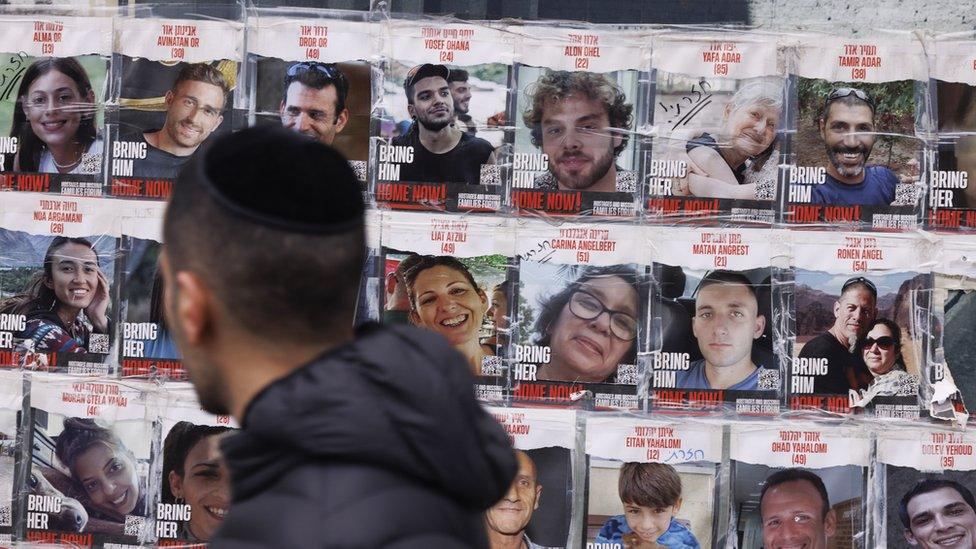
The families of those who were kidnapped by Hamas have been calling for the release of all the hostages
The attacks of the 7th of October killed some 1,200 people in southern Israel. More than 100 of the 240 hostages who were snatched and taken to Gaza remain in captivity.
Meanwhile, Israel's air and ground assaults in the Palestinian territory have killed about 23,000 people, the Hamas-run health ministry in Gaza says. The vast majority of Gaza's 2.3 million residents have been forced to flee their homes amid widespread destruction.
Yet, last week, a poll by the Israel Democracy Institute (IDI) found that two-thirds of Israelis did not think Israel should agree to demands from the US to shift to a phase of the war that reduces heavy bombing in densely populated areas.
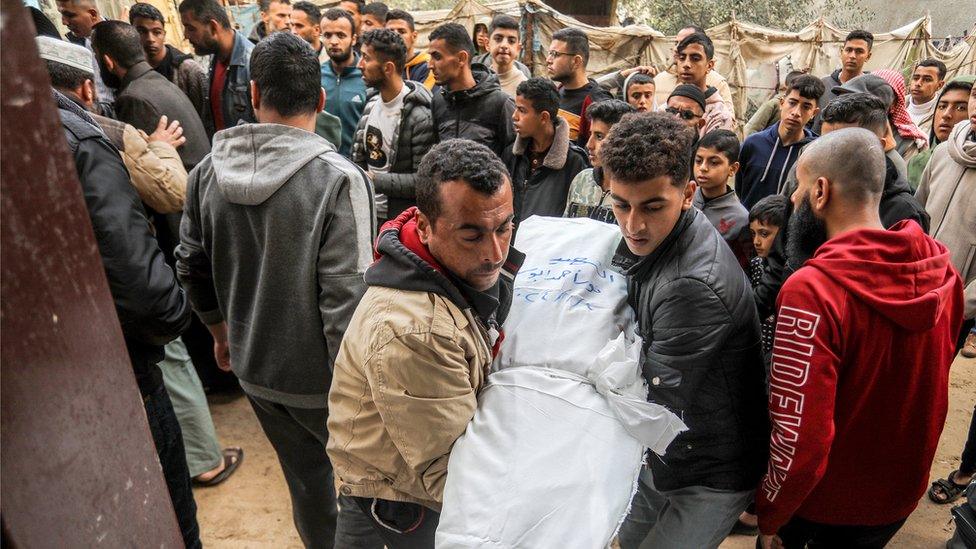
More than two-thirds of the people killed in Gaza are women and children, according to the Hamas-run Health Ministry
"People who want to see what is happening in Gaza can see it via the internet," says leading IDI pollster, Professor Tamar Hermann, referring to the human suffering. "But the media is not bringing to our living rooms the same images as people see in Europe or other states in the world."
She adds that scenes of Gazan civilians celebrating the 7th of October assault undermined public sympathy in Israel.
"Unlike in previous military operations, the civilians are not perceived here as innocent bystanders. The sympathy is quite low," Prof Hermann says.
Heading towards the Old City, I find Tzafir Bracha who has come for a visit. He is staying with relatives and is one of tens of thousands of Israelis, most of them evacuated, from southern Israel who has not returned home for three months. He is still reeling with the shock of what happened.
"I think it'll take time for everybody to understand how big this event was [on 7th of October] and what a catastrophe it was. I think most of us are still licking our wounds," he tells me. "I think that nobody can understand this unless it happened to them."
Tzafir believes the world should see that Hamas must be defeated so it is no longer a threat.
"We have to have a victory. You have to find the people that caused this and take them [away] from society and only then can you really have peace," he says.
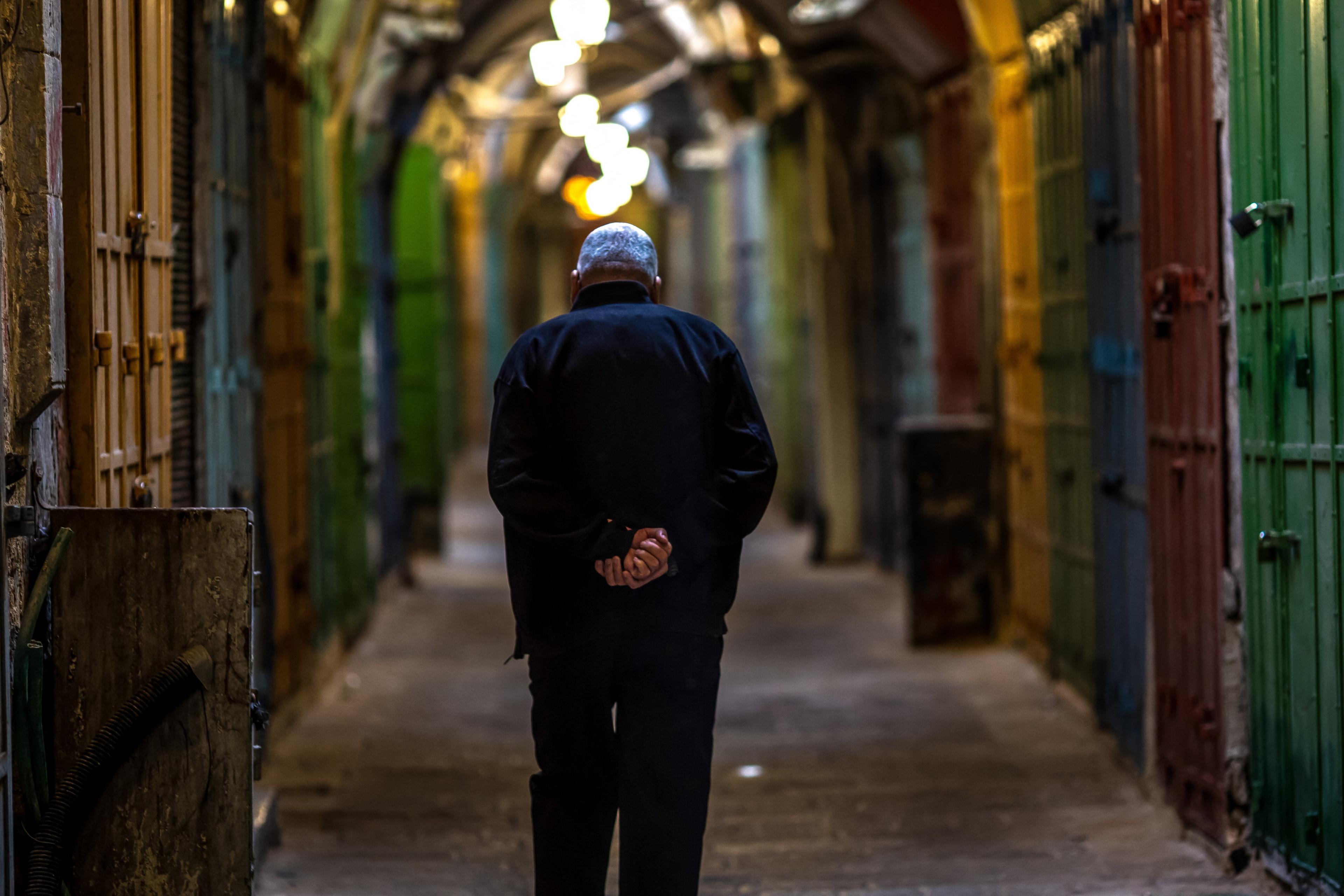
Streets in Jerusalem's Old City have been mostly empty since the start of the war
In the narrow streets of the Old City, many Palestinians from the occupied East of Jerusalem tell me they feel restricted in what they can say publicly. Many point out how social media posts are often monitored by Israel.
But everyone I meet is following the war minute by minute.
"I am on Instagram, on X. I follow people from Gaza," says Haneen, a student nurse. "We all feel so sad."
But she tells me she doubts Israel's official version of what happened on the 7th of October.
"We know as Palestinians that Israel used propaganda, so we don't believe what they say. We know there is some part that's right, but other parts are not right."
Her position is common among Palestinians, according to the latest poll carried out in the occupied West Bank and Gaza by the Palestinian Center for Policy and Survey Research.
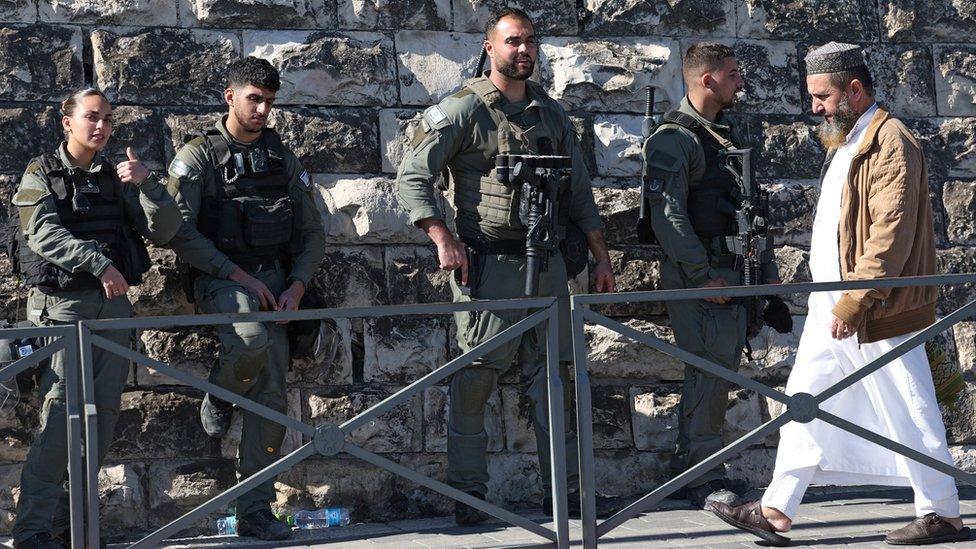
Polls estimate over 70 percent of Palestinians approve of Hamas's October 7 attack
"The overwhelming majority of the Palestinians do not believe Hamas has committed any atrocities, the overwhelming majority has not seen any videos that show atrocities. Of course, these videos are out there," says Professor Khalil Shikaki, who oversaw the poll.
His research found increased support for Hamas, mostly in the West Bank, although a majority of Palestinians still do not back the armed group, seen by Israel, the UK and many Western countries as a terrorist organisation.
Most notably, in the survey, 72% of the Palestinian public believed that Hamas's decision to launch its offensive on 7th October was correct.
A Palestinian shop owner who does not want to give his name tries to explain the reasoning. He accuses foreign media of ignoring the broader context of the long years of blockade imposed by Israel and Egypt after Hamas took over in 2007 and the tough living conditions it created.
"People in Gaza have been living in a big prison," he tells me.
Now he despairs of the international community because it is not doing more to stop the fighting.
"We see difficult things on the TV. Very difficult. Children get killed. Women get killed. Old people get killed with no reason. They didn't do anything. It's unbelievable," the shopkeeper says.
"Honestly, I don't imagine, how could people be watching these kind of things and they have the power to stop these things? They are watching a Hollywood movie? It's like nothing [to them]?"
In Jerusalem, there is a lot that divides the Israelis and Palestinians I have been speaking to.
However, most now share a deeper mutual mistrust and a common fear about what the months ahead have in store. There is also a strong feeling on both sides that people around the globe do not understand their pain and suffering.
Related topics
- Published5 January 2024
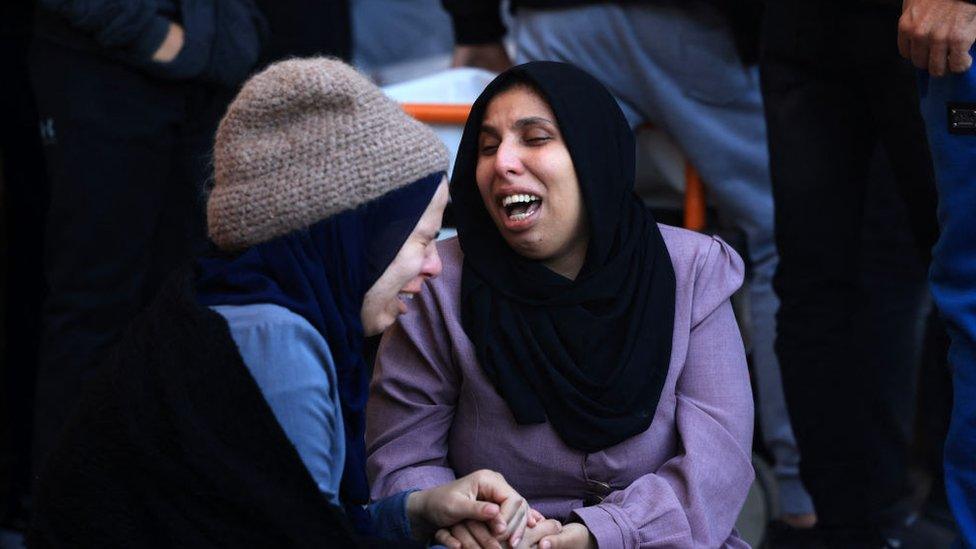
- Published2 January 2024
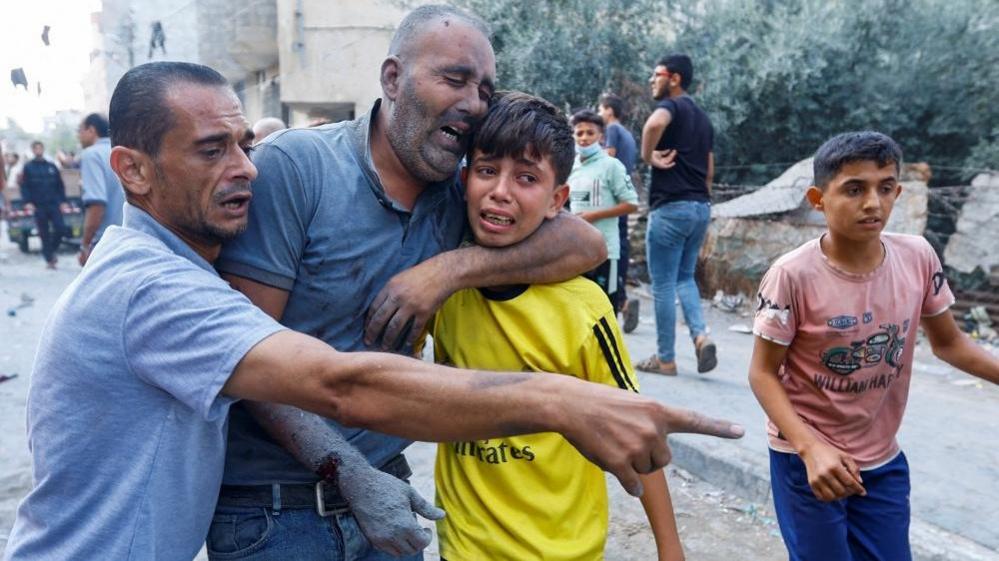
- Published29 December 2023
